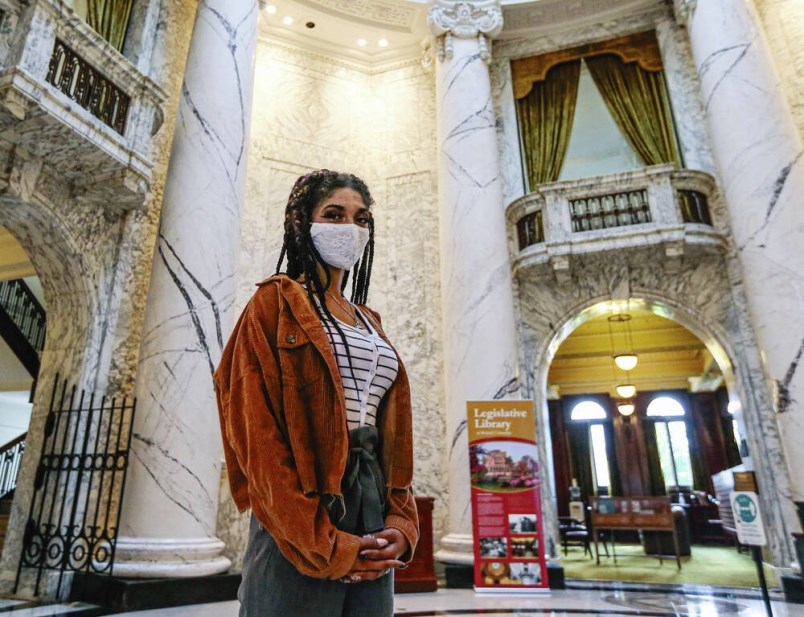A Grade 12 Esquimalt High School student says she wakes up every morning missing a close friend who died by suicide. And she’s frustrated at the lack of in-class education to help others.
“It’s incredibly hard to wake up every morning and not be able to text my best friend that I used to hang out with every single day,” said Jayda Linn Abdelrahim. “There’s so much more that could have been done and still to this day, more people are dying. We just need to understand that people need help.”
B.C. Green Party Leader Sonia Furstenau read a statement by Jayda during question period at the B.C. legislature last Thursday. It addressed the number of youth struggling with mental-health problems and substance addictions and the need for earlier preventive education.
Jayda said she grew up around multiple friends facing mental-health challenges and addiction. She has had her own mental-health struggles and in recent years her grades have suffered.
When best friend Genessa, 16, died in November last year, Jayda was inspired to help others “before they start getting addicted and before we’re in hospitals and before we don’t have a job and we’re sleeping on the streets, before any of it.”
Genessa’s obituary describes her as interested in many activities, including reading, writing and dancing. She is characterized as a fierce supporter of her friends and social justice issues. “Throughout Genessa’s life, she suffered from a decline in mental health. It was difficult to watch her battle her demons, while her family, friends and mental health professionals rallied around her.” Genessa was too hard on herself, it said.
Jayda said today’s students face many problems. They fall behind in class when their mental health is poor and there’s not enough hands-on support to keep their education and grades on track. Counselling alone doesn’t always work and it can take months to get appointments with counsellors. Not every student can talk to their parents, and there’s accompanying shame and stigma for making poor decisions or speaking out.
Climbing out of all this “takes a lot of power” and schools aren’t providing enough resources or a road map, said Jayda.
In her statement, Jayda posed questions that she says are on the minds of young students, including: Does one-time drug use lead immediately to addiction? Is healthy drug use possible? If a friend uses drugs, are they a bad person? How do students with mental health and addictions challenges stay on course to graduate?
“We don’t get any education on mental health or drugs in schools,” Jayda said. “These are the questions that happen outside of school. When we see people struggling and when we see our friends not coming to school and when I hear that my friends have no place to go — it hurts that we’re at this point and it keeps happening more and more from a younger age and people are passing away so young without any education and not knowing what they even did, before they did it.”
Since January 2020, 461 people on Vancouver Island have died of toxic drug poisonings, almost half in Victoria.
The only way to truly influence youth on drug prevention and mental-health awareness is through education, including bringing experts into the classroom, she said.
“This starts with daily conversations, not enforced by police, or scared into them with ‘school etiquette,’ ” she said in her statement. “This starts with our survivors being given the chance to share their experiences, share how they got involved with drugs in general, the life they lived, the decisions they had to make, and what motivated them to find their recovery path.”
The B.C. Education Ministry said students in the province learn about the dangers of drug use beginning in kindergarten and that mental well-being is one of four areas of study in the physical and health education curriculum each year to Grade 10.
In Grade 2, mental-health education addresses strategies to deal with “worries,” and in Grade 7, students discuss problems related to mental well-being and substance use.
The ministry agrees education is key to ensuring students know the risks of potentially deadly drugs such as fentanyl and other opioids. Schools have counsellors available and the ministry “is working to ensure schools and education partners have access to evidence-based, current resources on overdose prevention and education.”
But Jayda said school counsellors and police tread lightly when talking about depression and suicide and everyone talks about calling 911 in an emergency, “but they don’t explain why these things are happening in general.”
She would like more education on what today’s illicit drugs do to the brain and how to help peers who are falling into addiction. “I just don’t want any more people to die,” she said, pointing to the April 14 accidental fentanyl overdose death of Gordon Head Middle School student Allaya Yoli Thomas, 12.
She noted that months prior to her death, the girl had gone to hospital three times for apparent overdoses.
“They just send you back out to do the same things,” Jayda said. “It shows that it’s being ignored and that’s getting worse.”
The province said it’s committed to supporting students before, during and after school, which includes opening eight more in-person Foundry centres — one-stop-shops for mental health and addiction — for a total of 19.
Furstenau said it’s not enough for the government to point to resources — it has to listen to people with experience and look at the data.
“The absolutely devastating size of [the opioid] tragedy requires a level of urgent action that we’re not seeing,” Furstenau said. “It’s time for this government to recognize we all have to work together on this.”
Online resources




